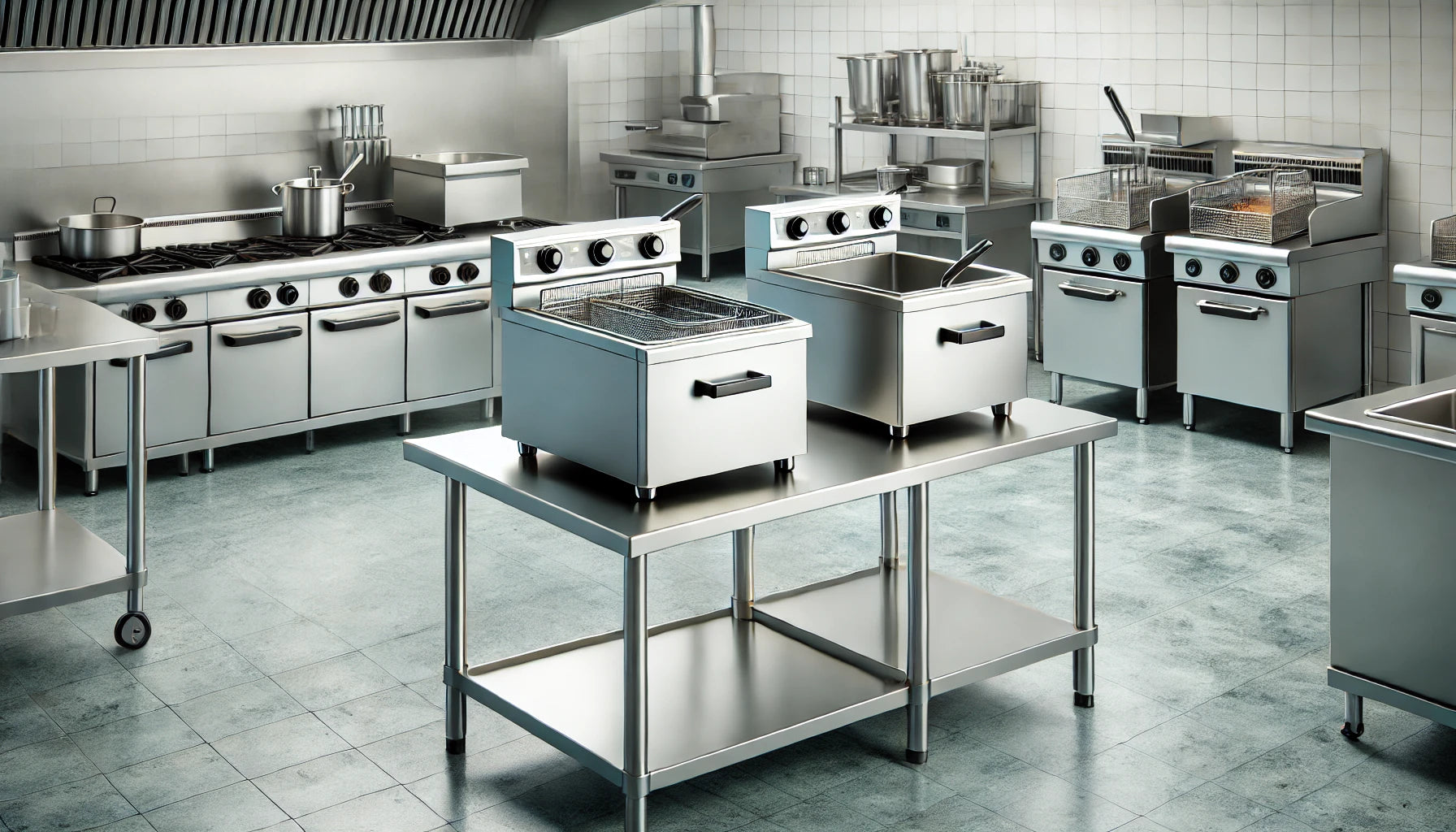Whether you already have a deep fryer and are looking to upgrade or are buying one for the first time, there are a few things to keep in mind. No matter which model you have, deep fryers are an investment piece for any kitchen, which means you’ll want to maintain them as well as possible to extend their lifespan. We’ll give you all the best tips for maintaining a commercial deep fryer, from best practices for when you’re using it for both safety and efficiency to how to clean a commercial deep fryer for optimal results.
Proper Usage - Startup, Cooking, and Shutdown Best Practice
Maintaining your commercial deep fryer starts with proper usage. Making sure you’re following the manufacturers’ instructions each and every time, from startup through to shutdown, will help to extend the lifespan of your deep fryer.
Pre-cooking startup: Before you even switch your deep fryer on, you want to make sure the cooking elements are completely free from any water. If you’re pouring oil over hot water, you can end up with a hot oil splatter, which poses a fire and safety risk.
Cooking: Different deep fryers will have different cooking instructions. Equally, they’ll also need to cook food at different temperatures depending on your oil choice. Different oils will cook food at different temperatures depending on their unique properties and density. You may want to experiment (carefully!) with different oils to find the best one for your particular deep fryer.
Shutdown: After you’ve finished cooking, turn your fryer off and let the oil cool completely before doing any filter maintenance or draining the oil. You want to avoid handling hot oil to reduce any risk of burns.
Temperature Control and Avoiding Overheating
As mentioned, cooking at the optimal temperature is key and there are a few best practices for deep fryer upkeep by utilising temperature control. Not only will you maintain the integrity of your oil, but you’ll get better quality food and extend the life of your deep fryer.
- Preheat your oil to the recommended temperature before you add whatever you’re about to cook. Overheating will increase your risk of fire, while underheating will give you soggy food. Different oil types will require different temperatures, so operating within those guidelines not only saves you from spoiling your oil but will also give you a better cooking result.
- Once your oil is at the optimal cooking temperature, make sure you’re keeping an eye on the thermostat. It’ll give you an accurate reading and make sure that you aren’t overcooking your food or overheating your oil.
- If you have a lot of cooking to get through, it can be tempting to put in a large load, but this won’t give you the best results. You can run the risk of dropping the oil temperature, resulting in higher oil absorption and uneven cooking with a poor final result. If you’re consistently finding you need more space, you might want to invest in a larger deep fryer like the 5 Burner FryMax RC500E with 37L oil capacity.
- Cleaning your commercial deep fryer is one of the most important parts of maintenance. Aside from ensuring you get good flavour from your food, it also means you won’t have old oil residue that can be a heating risk or potentially spoil the flavour of your cooking.
Oil Maintenance - Filtering and Oil Quality
Filtering Oil
If your deep fryer can filter oil itself, checking the filters is high on the list of the commercial fryer maintenance checklist. While you’ll typically be able to use just one filter per day, for particularly frequent use or high volumes of food, you may want to replace them more often. The filters will serve to catch stray pieces of food that can later burn and spoil your oil if they aren’t working optimally, so make sure you’re checking them regularly.
For deep fryers that don’t have their own filtration system, you may want to purchase a separate, portable oil filter like the FryMax LG-20E Oil Filter Cart.
Oil Quality
Using high-quality oil and maintaining it properly can significantly improve the performance of your fryer and the quality of your fried foods. Aside from filtering it regularly, you’ll also want to keep the oil level topped up. It’ll drop slightly after frequent use, so we recommend keeping it at a consistent level. This ensures you’re getting even heat distribution throughout the fryer, as well as consistent frying results in your food.
Generally, you’ll need to replace your cooking oil after 8 to 10 uses. You’ll know it’s time to refresh it when it begins to smell off or becomes dark and discoloured. When your oil is due for a change, it’s a good time to give your deep fryer a deep clean.
Cleaning - Daily vs. Deep Cleaning
Daily Cleaning
You’ll want to ensure you’re cleaning your commercial deep fryer every day to ensure both the food safety and quality remain at a high standard. At a minimum, you’ll want to do each of the following steps once your deep fryer has been switched off and the oil has cooled completely:
- Drain the oil after the fryer has cooled. You’ll want to pour it into a food-safe container in preparation for the next step.
- Once you’ve removed the oil from the deep fryer, you’ll want to filter it to remove any remaining debris. While some commercial deep fryers have oil filtration systems, it’s still worth checking that it’s as clear as possible. To get the most out of your oil before you need to replace it, you might want to consider getting an oil filter system. They not only make the filtration job easier but can also extend the use you can get from your cooking oil by up to 30%.
- Once your filtered oil has been stored, you’ll want to clean the deep fryer itself. With a mild cleaning solution and a soft cloth, make sure you wipe all surfaces thoroughly. Clean both the top-level surfaces as well as the interior to keep them grease-free.
- Clean the baskets separately in hot, soapy water, making sure to scrub them thoroughly to remove any remaining food particles and oil.
Deep Cleaning
Outside of your daily clean, you’ll also want to do a deep clean every week or two to ensure that your maintaining your commercial deep fryer to the best standard. This process helps prevent grease buildup, maintains the cooking performance and flavour of your food and reduces the chances of oil fires.
- Start the boil-out procedure by filling your deep fryer with water and a commercial-grade fryer cleaner. Allow the solution to heat up to a boil before turning it down to a simmer for 20 to 30 minutes. Make sure you’re supervising the deep fryer the entire time to prevent it from boiling over. This process will clear away a lot of more stubborn grease and any food debris stuck to the deep fryer.
- Next, you’ll want to scrub the interior with a brush to clean the fryer's interior. Make sure you’re paying special attention to the heating elements and the areas you aren’t cleaning as thoroughly in your daily cleans. If you want a lower maintenance option that doesn’t require as much manual effort, the newest generation of ElectMax 700 Series Induction Fryers don’t have any elements that get submerged in oil, making cleaning simpler and more efficient!
- After you’ve let the cleaning solution cool, allow it to drain, and then rinse everything thoroughly with water to remove all traces of detergent. Then, finish by drying everything before you refill your deep fryer with oil.
Perfect Pairings
We have plenty of recommendations for you if you’re looking for companion appliances to go with your existing deep-fried menu items:
- Commercial ovens are essential in any kitchen, perfect for both baking and roasting needs.
- Oven ranges are a versatile option for when you want to cook and roast at the same time.
- If you’re looking for something that delivers a high volume of flat-grilled foods, from veggies to meat, we recommend exploring griddles.
- Rather than stainless steel pans, woks can be used for high-heat stir-frying for an exceptional final result.
Silverchef Equipment Finance
If you’re looking to add a deep fryer to your kitchen or want to try a larger model but aren’t ready to invest fully yet, we recommend Silverchef’s Rent-Try-Buy option. Their equipment finance enables you to rent your kitchen equipment with the added benefit of buying or upgrading it later. This gives you plenty of time to experiment with different models in order to find what’s best for you and your kitchen as your business expands.
If you have any further questions about deep fryer maintenance or need help choosing the best model for your kitchen, reach out to the team at Restaurant Equipment anytime. You can contact us via email at sales@restaurantequipment.com.au, book a free consultation or give us a call at 1300 35 25 45 now!






